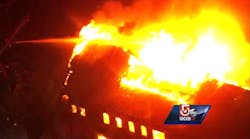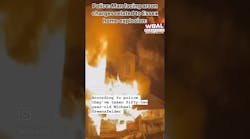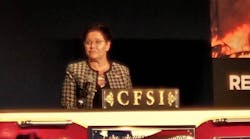Jan. 26--LAWRENCE -- The inferno that destroyed a landmark mill on Jan. 13 was a disaster a decade in the making.
It was fueled by local and state officials who allowed building and fire code violations to persist, environmental violations to go uncorrected and unpaid tax bills to pile up as the property was sold and resold, records show.
The former city police officer who now owns the mill complex owes more than $5.4 million in unpaid property taxes, water bills, charges for fire watches and interest.
Another potential disaster awaits the city under the cinders at 9 South Canal St..
That's the likelihood Lawrence may have to assume the cost of demolishing and cleaning up the charred remains of the building, now a blackened eyesore at a gateway to downtown. Building Commissioner Peter Blanchette says the bill could reach $500,000.
That process started after arson inspectors left the site three days after the fire, when Blanchette directed owner David Padellaro to secure the teetering ruins and submit a demolition plan.
How much more will get done anytime soon is unclear, given Padellaro's record of disregarding earlier orders to demolish the 130-year-old mill and two adjoining buildings.
Those earlier directives began on Nov. 17, 2010, when the state Department of Environmental Protection ordered Padellaro to submit a plan for taking down 9 South Canal St. and an adjoining building at 19 South Canal St., citing hazardous conditions and environmental contaminants, records show.
When no plan arrived after 10 months, the DEP reissued its demand and threatened Padellaro with fines of up to $1,000 a day, records show.
Also in 2010, Padellaro demolished most of a third dilapidated building on the site that the city ordered taken down. Work stopped when the DEP continually rejected his plan to remove the asbestos in the building's boiler room and when contractors walked off the job, saying they were not being paid or that Padellaro's checks were bouncing.
In July, Padellaro was convicted of writing three bad checks totaling $6,705 to Western Oil, a Rhode Island company he hired to remove oil from tanks on the property. He was ordered to pay the company and put on two year's probation.
The DEP eventually fined Padellaro $26,600 for failing to provide it with an inventory of the asbestos, oil and other toxics on the property. When the fine went unpaid and failed to motivate Padellaro, the DEP got a court order allowing it to send Shaw Environmental, a Louisiana based company, onto the property to do the environmental assessment.
The DEP billed Padellaro $49,251 for the work, which also has not been paid, said Edmund Coletta, a spokesman for the agency.
Little has occurred on the property since then.
Enforcement attempts by the city and state ended with the uncollected fines. Demolition and clean-up did not go beyond Shaw Environmental's survey of contaminants, now 18 months old.
"We continued to try to work with him, to push him to get the work completed," Coletta, said. "Unfortunately, he didn't do that."
Padellaro has no insurance on any of the buildings, Blanchette said, increasing the likelihood that the city may have to pay to demolish them.
"As much as I'm hoping he does something, I think the chances are very slim," Blanchette said, adding that the city has "done the best we can with the means we have" to enforce building and fire codes on the property over the years.
Bought for a buck
Padellaro is a former city police officer who was fired in 1998 for filing bogus overtime claims and incident reports. He bought the mill property for $1 in 2010 in a deal city officials said was intended to help a previous owner dodge the unpaid tax and water bills.
As bills mounted, a separate effort by the city to secure the mill's turbines and other valuable property inside the buildings also fell flat.
By the time the city sent a video crew into the mill in 2011 to create a record of the machinery that it might lien along with the land and buildings, there was little left to take, according to Patrick Blanchette, the city's former director of economic development and brother of Peter.
"Nothing of value came back," Blanchette said.
Padellaro hung up on a reporter seeking an interview.
The unpaid $5.4 million bill for taxes, water, fire watches and interest makes Padellaro the city's biggest tax scofflaw by far and adds an inglorious chapter to the story of what was once a thriving symbol of Lawrence's manufacturing might.
Merrimac Paper Co. flourished for more than a century at South Canal Street and Broadway. It produced high-quality paper for clients that included National Geographic magazine. By the end of World War 1, the sprawling riverfront complex was producing 125 tons of paper a week and employed 275 people, according to documents on file at the Lawrence History Center.
The company hung on for decades longer than most major manufacturers in Lawrence, which either failed or fled. When the end came with bankruptcy in 2005, Merrimac Paper's total debt was measured in the tens of millions of dollars, not including pensions and stock options owed to employees, records show.
In all, the city was one of more than 300 creditors listed in bankruptcy filings, which also included the regional sewer district and the IRS.
The company stopped paying the city its property taxes and water bills in 2002. The city placed its first lien on the property a year later. The company's debt to the city exploded overnight from a few hundred thousand dollars in 2005 to $3.3 million in 2006, suggesting that the city may have waited to fully tally what the company owed until after it was dissolved in bankruptcy and its assets were dispersed.
Bankruptcy sale
Former mayor Michael Sullivan referred questions about the effort to collect from Merrimac Paper to Scott Jordan, who was the city budget director for 20 months in 2003 and 2004 and is now an undersecretary for the state Office of Administration and Finance.
Jordan said there were thousands of properties in the city behind on their taxes at the time and said he couldn't recall what effort was made to collect Merrimac's bill. He noted that the city declared an amnesty that waived interest on overdue property taxes, which he said brought in $3 million over three months.
A Haverhill company run by Stephen Stapinski of Andover and King Weinstein of Maine bought the maze of buildings on the 2-acre riverfront property for $82,500 at a bankruptcy auction in 2005. Stapinski said he was persuaded to buy the site by what he said were assurances from the city that it would suspend its effort to collect the property's overdue water bills until the property was developed.
"Nobody was going to buy it with the outstanding water bills on it, $3.2 million," Stapinski said.
The unpaid bills grew over the next few years as Stapinski and Weinstein prepared plans for a mixed-use development that was to include restaurants and 100 apartments.
Stapinski said he received a $17 million loan guarantee and a promise to pay off the water bills from Mass Development, a state agency that provides financial backing and other incentives to difficult projects. He said he also had a commitment from Enterprise Bank to lend the money.
The project stumbled. The loan guarantee expired. The city elected a new mayor, William Lantigua, who Stapinski said was not interested in the project.
"This story is not about me," Stapinski said. "It's about the current owner, about Merrimac Paper closing. The story is about the city not wanting and not allowing the property to be developed."
Lantigua, who left office Jan. 2 after losing his re-election bid to Daniel Rivera, could not be reached.
Blanchette, the former city economic development director, said Stapinski never submitted substantive plans for his development but only asked to have the tax bill abated.
"Steve Stapinski came to us in 2010 looking for some type of abatement," Blanchette said. "The Lantigua administration was unwilling to do anything because they had nothing concrete before us and there was no significant promise about the $3.5 million that was owed. There really was no trust, no incentive for the city to work with them."
Meanwhile, the deteriorating buildings became a popular encampment for vagrants and the homeless. Fires ignited regularly, causing the city to post firemen at the site around the clock. The bill for the fire watches reached $142,000 by 2007, and also went unpaid.
When it became clear he wasn't going to get the approvals to redevelop the property that he said he was seeking, Stapinski was able to pass along the bill for the fire watch and the mounting tax and water bills and the interest by selling the property to Padellaro.
For his investment of $1, Padellaro took over the property and the debt to the city, plus Stapinski's promise to pay $125,000 for demolition costs.
Lantigua's former chief of staff, Leonard Degnan, questioned whether Padellaro had the resources to do much with the former mill. He said $125,000 would fall short of the cost of demolition by hundreds of thousands of dollars.
"I don't know anybody in their right mind who would want to have this property with all the issues involved," Degnan said at the time. "Four major fires. A $2.8 million tax bill. Who would want this property? It's an investment that went bad that (Stapinski) now wants to walk away from."
Lantigua promised to explore "whatever legal remedies I have at my disposal" to force Stapinski's development company to pay the taxes and fees, including placing a lien on Stapinski's Andover house and on a half-acre on Broadway in Lawrence that Stapinski and Weinstein were then leasing to a Burger King franchise.
Stapinski openly mocked the effort.
"I heard repeated rumors that the mayor's office would seek some kind of revenge against me for selling the (mill)," Stapinski said in an email to The Eagle-Tribune late in 2010. "I learned the city . . . attempted to file a statement of claim against my home residence. Because of their usual ineptitude and incompetence it completely failed in this attempt."
Any liens that were placed on the properties didn't stick. Stapinski's home, -- a 3,841-square-foot Colonial then assessed at $850,000 -- is owned by a corporation headed by his wife. He and Weinstein sold the Burger King franchise unencumbered by a lien.
Like Stapinski, Padellaro also has had his way with the city and state. The city withdrew its around-the-clock fire watch from property when the bills for it went unpaid and after Padellaro agreed to post his own more affordable watch.
Acting Fire Chief John Marsh said he is uncertain whether Padellaro's private watch was at the mill when the fire broke out on the evening of Jan. 13, but said firefighters reported seeing no one on the property when they arrived. Marsh said that would be part of the ongoing investigation into the cause of the fire.
'Lawrence Proud'
Part of what has flustered city and state officials at the mill site is that their most powerful tool for getting property owners to pay their taxes and clean up their properties -- which is the ability to simply take the sites and sell them -- is unrealistic in this instance because the property would be more of a liability than an asset.
One way out might be to entice a developer with the grants and tax breaks available under state and federal brownfield programs.
"I do think it's unfortunate that we didn't do better in going after the previous owner, who had more at stake and more for us to get," said Mayor Rivera.
"We're going to be looking to make sure that owners of all properties are doing what they're supposed to do, but in this instance, the law is against us," Rivera said. "What do you do with a property owner who doesn't fix a situation except take the property? And we don't want it because we don't know what's there."
Shortly after acquiring the site, Padellaro erected a sign at the entrance with an image of a redeveloped mill and wording suggesting the city would be a partner in a redevelopment.
"Lawrence Proud, City of Lawrence and Mayor Lantigua," the sign reads in large, bright letters. Two years ago, a spokesman for Lantigua said he did not authorize use of his name and would ask it be removed from the sign. It remains.
State arson investigators have not announced the results of their investigation into the cause of the fire.
Acting Fire Chief Marsh has called the cause of the fire "questionable."
Copyright 2014 - The Eagle-Tribune, North Andover, Mass.






